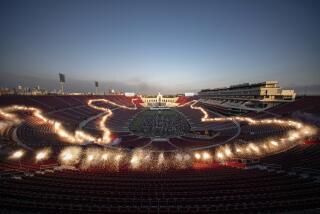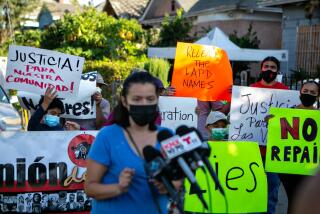Guard Who Saw Bomb Now Called a Suspect
- Share via
ATLANTA — Three days after a pipe bomb hung a wreath of terror over the centennial Olympic Games, investigators said Tuesday that the security guard who had been hailed as a hero for finding the bomb and warning authorities was now a suspect in the case.
No arrests have been made, and authorities stressed that many people have been questioned in connection with the bombing. An FBI source added, however, that Richard Jewell, 33, who worked for a Southern California firm under contract to provide security to a portion of the park, could correctly be called a suspect. “We’ll see where it goes after we talk to him,” he added.
Jewell, who was questioned Tuesday evening at FBI offices here, denied to reporters that he planted the bomb, which killed an Albany, Ga., woman and injured 111 others when it sent shrapnel flying into a crowd gathered for a free concert. Ten of those injured were still hospitalized Tuesday.
Information from a variety of sources caused authorities to want to question Jewell, said a law enforcement source. He declined to detail evidence.
Jewell, who worked as a security guard at the AT&T; Olympic Global Village, where the major music concerts are held, first was questioned for about 10 minutes Tuesday afternoon by two FBI agents at his apartment in the Claremont Park section of Atlanta. Moments after the agents left, Jewell followed, clad in sunglasses, shorts, a white T-shirt with the logo SECURITY on the back and security accreditations around his neck.
Hours later, attorney Watson Bryant emerged from Jewell’s apartment and said FBI Agent Don Johnson told him “Jewell was not a suspect, was not a subject, was not a target.”
“Richard had nothing whatsoever to do with planting this bomb,” Bryant told reporters.
The beefy suspect, 33, while still being hailed as a hero, gave several television interviews in which he modestly explained his role in the bombing. ‘I love Atlanta, and I want to be a part of the feeling of the Games,” he told NBC.
He added, “I happened to be in the right place at the right time, and I did the job I was trained to do.”
Later, Jewell denied planting the bomb. “No, sir, I did not do this,” he told reporters outside his apartment.
As for reports that he was under investigation, Jewell said, “I’m sure they’re investigating anyone who was in the area.”
Jewell said in interviews following the explosion that he hoped his stint as an Olympic guard would lead to employment with a law enforcement agency.
His ambition evoked memories of an incident at the end of the 1984 Olympics, in which a Los Angeles police officer was initially hailed as a hero for disarming a bomb on the Turkish team’s bus but was later arrested for planting the device. The officer said he hoped that by earning plaudits he could transfer out of the Metro division.
Jewell was an employee of Piedmont College, a 1,000-student private school in Demorest, Ga., from April 1995 to May 21, 1996. In a statement Tuesday, the college said that when President Ray Cleere learned that Jewell had found the bomb he notified authorities of “some concerns related to [his] previous employment . . . at Piedmont College. It should be noted that he was allowed to resign after a number of minor employment incidents. However, he was generally considered a good employee.”
“He certainly enjoyed the limelight while he was here,” said Cleere. “He was not a bad employee, but his level of investigative enthusiasm we felt was a little too much for a campus of our size.”
Jewell has had a series of law enforcement jobs, working for nearly three years as a deputy with the Habersham County Sheriff’s Department in northern Georgia. A sheriff’s dispatcher who declined to be identified said that Jewell left the office a little more than a year ago. The dispatcher would not characterize Jewell’s employment history there.
Jewell then went to work briefly as a guard with Piedmont College before leaving in May to take a post with the Borg-Warner security firm, then hiring guards and security staff to provide help at the Olympic Games.
Borg-Warner, which had been hired by AT&T; to provide security outside its quarters at Centennial Olympic Park, lost its security contract before the Games and was replaced by a firm headed by an Anthony Davis & Associates, based in Bloomington, Calif. The Davis firm let some guards go and kept others, among them Jewell.
“I was pleased with his performance,” said Davis. “We stand by him. But because of the allegations he is now on paid leave.”
Jewell was the only Atlanta resident hired by the Davis company, which has 50 other people working in Atlanta, all of them Californians. The background check on Jewell was done by Borg-Warner and no additional background check was done by Anthony Davis & Associates. “We absorbed him,” Davis said.
Jewell had been working for Anthony Davis for seven or eight days, paid $12 an hour. “We felt very comfortable with him,” Davis said. “We are obviously quite stunned.” Davis said Jewell “apologized for any embarrassment he’s caused my company.”
Authorities said the investigation continued to advance Tuesday on other fronts.
One crucial piece of evidence that will likely prove invaluable was the discovery of a large intact chunk of metal piping over the weekend. It should enable law enforcement agents to reconstruct the explosives used in the blast and determine their origin.
A two-by-three-inch portion of plumbing pipe, found in the park soon after the blast by an Atlanta teenager and turned over Saturday to the FBI, has enabled government explosives technicians to reconstruct the pipes used in the blast and start the process of tracing the metal tubes back to the firms that manufactured and sold them.
Even while authorities continued their investigation, bomb threats continued to disrupt life in Atlanta. More than 100 bomb threats have been investigated since Saturday’s explosion, according to the FBI.
The Omni Hotel downtown--where 10 of 11 members of the American basketball “Dream Team” is staying--was evacuated Tuesday morning because of a scare. Reportedly a fake bomb was found.
The team has three more games to play. “I came up with a great idea after the bomb threat today,” Dream Teamer Charles Barkley said. “I think we should play all three of the teams today and then get the hell out of town. I’m going to pass that on to Mr. [Juan Antonio] Samaranch,” president of the International Olympic Committee.
Meanwhile, 21-acre Centennial Olympic Park, scene of the fatal explosion, reverted from crime scene to people’s park Tuesday.
Atlanta Olympic Committee Chairman Billy Payne reopened the park with what he called “a special program of remembrance and revival.” Trumpeter Wynton Marsalis played a mournful solo rendition of “Just A Closer Walk with Thee” before Andrew Young, the former Atlanta mayor and a vice president of the Atlanta Committee for the Olympic Games, spoke in tones more celebratory than solemn.
“We’re here to proclaim a victory,” he said, speaking from a huge stage just yards from the spot where the bomb went off. “We are here not to wallow in tragedy, but to celebrate a triumph, a triumph of the human spirit.”
Visitors bringing bags into the park now are subject to search. Federal agents and Georgia National Guard troops kept a high profile at each of the three entrances, scattered around the grounds, and on horseback on the adjacent streets. Metal detectors had been set up in front of the entrances to some of the exhibits within the park.
“I’m pleased,” said Sam Rafal, 36, who was there with his wife, Sandi, from Watkinsville, Ga., and wearing a homemade sign in his hat reading “Munich-Atlanta.” “I feel more secure.”
T.J. Clark of Atlanta was among those attending the memorial service. He came, he said, because a friend was among those injured in the bomb blast. “Shrapnel entered through his shoulder and out his back,” Clark said of his friend, who has since been released from the hospital.
“I was supposed to be down here that night to meet some friends,” he said. At the last minute, he decided not to come. Despite the bombing, he said he did not personally feel afraid until Monday, when he was on a commuter train that was evacuated because of a bomb threat, and an area of Buckhead near his home received a bomb scare.
“Before that, I hadn’t felt personally affected,” he said. “But that’s when I felt the collective hysteria that can take over.”
On hand at the park was a host of state and local officials, including Samaranch, Georgia Gov. Zell Miller, and, representing the athletes, Olympic swimmer Janet Evans.
Atlanta Mayor William Campbell, there with his family, said, “The most appropriate way to respond is to do what we’re doing today: Come back and show our resolve.”
Times staff writers Bill Dwyre, Louis Sahagun, Stephen Braun and Edith Stanley in Atlanta, and Patt Morrison and Hector Tobar in Los Angeles contributed to this story.
* GOLD VIEW: The U.S. softball team defeated China for the third time to win the first gold medal in the sport. S1
* WORLD VIEW: British sportswriters have described NBC’s coverage of the Atlanta Games as jingoistic, but the BBC coverage isn’t any more objective. S5
* CARL’S VIEW: The day after stealing the spotlight from Michael Johnson, Carl Lewis was trying to steal the anchor leg on the U.S. 400-meter relay team. S12
* TV COVERAGE: S2
More to Read
Sign up for Essential California
The most important California stories and recommendations in your inbox every morning.
You may occasionally receive promotional content from the Los Angeles Times.













